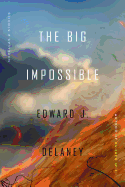
"Things just keep changing," a father laments to his son in "House of Sully," the centerpiece novella in Edward J. Delaney's pained, searching second collection of short fiction (after The Drowning). The Big Impossible concerns men adrift in an inconstant United States, uncertain of their place or their value, often reflecting on their lives in spare prose that soars even as it mourns.
Delaney (Follow the Sun) is adept at the telling detail, at the texture of bygone days: "House of Sully" summons the anxieties of a white family facing the tumult (and new freedoms) of 1968 with an attentive eye to fashion and integration. The marvelous "Big Impossible," meanwhile, punctures romantic fantasies of the rambling life, following a drifter's hardscrabble path from itinerant farm work in 1959 to decades later, as he nurtures the tentative roots he's finally planted. Delaney proves especially strong at depicting regret; his men, uneasy in changing times, tend not to open up to family or mingle well at parties. "My sisters were invisible to me then," notes one narrator, "simply strangers in the household to whom I assigned little attention." Ruminative standouts "Clean" and "Street View" compress decades into pages, the latter's flights of memory aided by Mapquest and Google. Only "David," about a present-day teenager bullied into terrible, predictable violence, lacks the rich specificity that is Delaney's hallmark. That story, though, builds to a bold argument for the power of fiction itself, insisting that nothing stirs empathy like urgent humanist literature. --Alan Scherstuhl, freelance writer and editor

